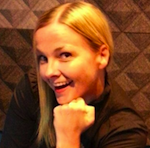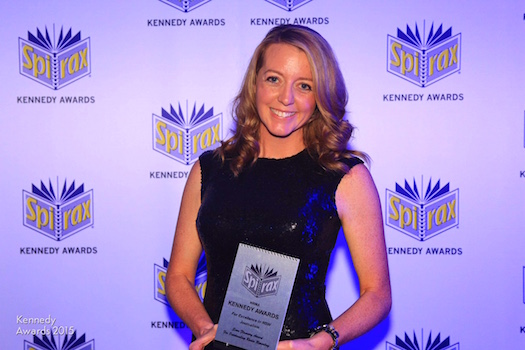Kirsty Meyer recently had the chance to catch up with the talented, witty, award winning journalist Natalie Peters from 2GB.
How did you get into radio?
I started in community radio at 2RRR which gave me a chance to press buttons, play golden oldies and chat to callers (usually my mum). From there I studied Media and Communications at Sydney Uni, did snow reports for radio and tv stations while living in Jindabyne, did lots of unpaid work experience, then landed a job in Sydney radio and went to AFTRS to learn more about the industry. In Sydney I went from 2UE, to WSFM and MIX, to 2GB, and also read for 973 and 4KQ in Brisbane.
Does anything still surprise you about your job?
Of course! I’m constantly amazed (and often stumped) by technology. It is progressing so quickly and opening up all sorts of opportunities for sourcing, creating and filing radio news. I still get nervous conducting interviews. And I’m also surprised by the stories we cover – by how wonderful and generous some people are, by how terrible others can be, by what people will reveal when you stick a microphone in front of them, and by how a radio community can pull together to help and make positive change.
If you weren’t a journalist, what else in the radio realm would take your fancy?
I love producing talk back radio, so working on the programs side of things appeals. Sales was one of my favourite topics studying radio at AFTRS so you never know, a stint at the other end of the building could be fun too.
What’s the first thing you do when you get into the studio?
When I arrive in the newsroom at 430am I can’t do anything till I’ve had a strong black tea to wake me up and get my voice working. It’s followed by a strong coffee not long after. When it comes to the news booth, the very first thing I do each half hour is check the news prompter is working – I still have regular nightmares about the screen freezing and my scripts being in Spanish. And I don’t speak Spanish.
Any bizarre habits at work?
We’re all germ freaks in the MRN newsroom so we’re constantly wiping every surface, keyboard, phone and mouse with antiseptic wipes. We think it’s entirely normal, but we do get some comments about being paranoid hypochondriacs.
What’s your most shocking and/or funny moment on air?
The Sydney Siege shocked me to the core. I was in the newsroom when we received the first reports of a police operation in Martin Place, and watching it unfold was surreal and upsetting. Of course you’re in work mode when you’re on air and push the emotion to the side, but journalists are only human, so we were all pretty shaken. MRN journalists did an outstanding job keeping our listeners informed that week and I felt so proud to be part of the team.
On a much lighter note, when it comes to shocking listeners, I’ve managed to drop one of the more offensive swear words in the middle of a news bulletin, by confusing the words ‘countries’ and ‘continents’. I don’t think I need to spell it out. And then there was the time I reported on “one of the two big titted items in the federal budget.”
Where’s the most bizarre place you’ve worked/reported from?
Sochi was probably one of the most bizarre cities I’ve worked in. The Olympic precinct was brand new, to the extent that hotels, footpaths and roads weren’t quite ready in time. You would turn on bathroom taps only to have the water swoosh into the sink then on to your feet below, as the plumbing wasn’t finished. You could only laugh, and it was one of the most amazing experiences of my life. I did live crosses from gondolas, standing knee deep in snow, with stray dogs chewing my shoe laces, and once while surrounded by armed militia.
What countries have you been to purely for work purposes?
I have been really lucky to travel overseas to report on stories of global importance. I was sent to Christchurch to report on the 2012 earthquake – the amazing people I met and the things I saw will stay with me forever.
Since then, I have covered the Olympics in London and Sochi, the Commonwealth Games in Glasgow, and most recently Anzac centenary commemorations in Gallipoli.
You won the 2015 Kennedy Award for Outstanding Radio Reporting for your coverage of Gallipoli – that must have been an amazing trip?
It was a privilege, professionally and personally, to travel to Turkey for ANZAC Day. All the history classes and text books in the world can’t prepare you for what if feels like to stand on the rocky beach at Anzac Cove or walk through the trenches at Lone Pine. I think it’s crucial the media continues to tell the stories of the Anzacs who fought 100 years ago, while focusing on the welfare of our living veterans, who need ongoing support.
If you had to, what career would you have chosen instead of radio?
As I kid I declared, “When I grow up I want to be a police officer. Or live at Macquarie Shopping Centre.” So really it’s a miracle I didn’t choose to be a Mall Cop. By the time it came to choosing Uni courses I knew I wanted to be a journalist, but I spent a few years chasing snow seasons before I landed my first job in the industry, so I guess ‘ski bum’ was the career I would have stuck with if radio didn’t come through for me.
What’s your favourite place in the world and why?
There are so many special places but nothing beats coming home to Sydney. It’s the perfect combination of big city and beaches, and my family is here.
If you weren’t in Sydney, what city could you picture yourself in?
Anywhere in Europe that allows me to cycle and swim in summer, and ski in winter!
Where’s your favourite place to go or thing to do in Sydney?
McIver’s ladies baths in Coogee is Sydney’s best kept secret. It’s an ocean pool perched on a cliff face and rock ledge at the southern end of Coogee Beach, that’s strictly for women only. It’s one of the most stunning places to swim and laze about in Sydney, and with a 20 cent entry fee it has to be the cheapest!
Last holiday destination?
I was lucky enough to spend a month in Turkey and Greece after covering Anzac Day commemorations in Gallipoli. Turkey is a fascinating combination of Europe and Asia, and I happily put on a good 5kg eating my way around the country.
What’s your favourite TV show at the moment?
I should probably say the nightly news, but I have to confess my guilty pleasure is The Bachelor. I’m more intrigued by the dynamics between the women than the guy flexing his muscles and staring off to the horizon! I don’t always actually watch it, but stay up to date with the goss by reading the brilliant recaps, like Rosie Waterland’s in Mamamia. My all-time favourite TV shows are political dramas like The West Wing and Scandal.
In your opinion, what qualities do you think make a good journalist?
The ability to tell a story, hard work, being nosey, humility, willingness to say yes to everything.
If you could go back and give your young self some advice about working in radio, what would you say?
Protect your voice! Late nights, loud bars, booze and karaoke are not good for anyone working in radio, and trust me, you’ll end up sounding like a 1800 call worker. The job itself is enough of a strain on your vocal chords, so protect them from other stresses.
Keep the details of every contact you ever make.
And keep a diary or journal of the stories you cover and all the amazing people you meet….one day it will make a great book!
You oversee the newsroom internship program at MRN – what is your advice to those trying to break into radio news?
Get some experience! Studying journalism or radio is great, but nothing compares to practical experience on the ground. When you approach newsrooms to ask about work experience, do a bit of research first so you are targeting your inquiry to the right person and not wasting your time.
Read/listen/watch the news every day – and don’t skip the sport, business and gossip sections. It’s really important to have general knowledge on a broad range of topics, from Abbott to Beiber.
What keeps you busy outside of MRN?
I’m a member of the The Hills Youth Suicide Taskforce, which is trying to drive down the youth suicide rate. Journalists have in the past been scared to talk about suicide on air, but that just hides the problem. I highly recommend everyone in radio checks out Mindframe for advice on how to discuss suicide and mental health responsibly. I have also started volunteering with Soldier On, which looks after returned service men and women. Aside from that I spend a lot of time with mates and family, and keep busy training for triathlons – why be good at one sport when you can be mediocre at three!
Where can people follow you?
Twitter: @nataliejpeters

Our profiler, Kirsty Meyer, has worked in news and programs in Australia and internationally.
This is one in a series of profiles Kirsty is compiling for radioinfo.
@KirstyMeyer

